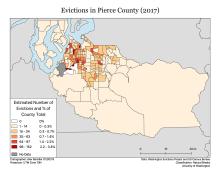"Washington is in the midst of an eviction crisis that is devastating communities of color." So state the findings of "The state of evictions: results from the University of Washington Evictions Project," a living website created by a team of University of Washington researchers including eScience postdoctoral fellow Timothy A. Thomas, iSchool lecturer Ott Toomet, Department of Sociology graduate student Ian Kennedy, and the Department of Geography's own first-year graduate student Alex Ramiller. The recent launch of the website has already caught the attention of local media, including KOMO News. Thanks to the initial introduction to the research team facilitated by Ramiller's committee chair, Professor Mark Ellis, Ramiller says "this interdisciplinary connection has provided me with the incredible opportunity to start establishing myself as a member of the UW research community. I had been looking to make connections with other scholars researching urban and housing issues ever since I decided to pursue my M.A. at UW, and the early support from my committee chair made this possible even sooner than I anticipated." Continue reading below for more insights from Ramiller about his involvement in this fascinating research!
On connections between this project and plans for the M.A. thesis: "While my original intention was to work on the Evictions Project independently from my own thesis research, I have found myself increasingly drawn to the idea of conducting additional research with the rich dataset we have created. The Evictions Project data provides us with an opportunity to study an abundance of questions related to the causes and consequences of evictions, which is increasingly recognized as having significant implications for social and racial justice.
As a result, my thesis research has evolved from one project into two -- while I am planning to continue pursuing my original thesis idea about the relationship between neighborhood politics and residential zoning decisions in Seattle, I also hope to further explore the implications of the Evictions Project data from a geographical perspective as part of a second research project."
On the value of geography to this work: "One of the most valuable aspects of joining this project has been the opportunity to work with an interdisciplinary research team as the resident geographer. Although I have less experience than other researchers on the team, I have always felt that my contributions to the project are valued, from my knowledge of GIS and geovisualization to my distinct perspective as a geographer. This project has also been a terrific learning experience for me, exposing me to new digital mapping tools and to sociological perspectives on issues of racial segregation and housing."
On the significance of this research: "My involvement with the Evictions Project is exactly what I was hoping for when I decided to go to graduate school in geography. it has provided me with the opportunity to work with other scholars across disciplines to conduct important cutting-edge research on an urban issue that has profound implications for social equity. While it may be a cliche, it is often true that academic research can become disconnected from the 'real world' simply because our research may not gain traction among the public or policymakers. With the Evictions Project, on the other hand, we are already seeing people take notice. My hope is that we can continue to influence the conversation about evictions as the project evolves and the results become more comprehensive and conclusive."
